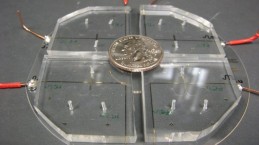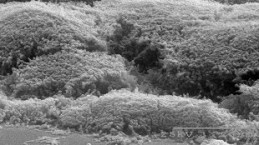Tinyest fuel cell generates power from bacteria
June 24, 2011

Four microbial fuel cells (credit: Kelvin Gregory, Carnegie Mellon University)
A tiny biological fuel cell, the smallest of its kind (0.3 microliters), has been built by researchers at Carnegie Mellon University (CMU), powered by bacteria.
The new device, the size of a single strand of human hair, generates energy from the metabolism of bacteria on thin gold plates in micro-manufactured channels.
The bacteria create a biofilm that uses natural organic compounds as fuel to generate power.

Bacteria growth on the anode (credit: Kelvin Gregory, Carnegie Mellon University)
For now, the microbial fuel cells produce only very tiny amounts of electricity, about 25 mA (milliamperes). For larger applications, many cells would need to be stacked together to increase the power output.
Future versions of this bacteria-powered fuel cell could replace batteries in microelectronic devices because they can store more energy in the same space.
“Our biology-powered fuel cell could be less costly to make and more easily deployed in remote areas than conventional batteries that require invasive maintenance,” said LeDuc, a CMU associate professor of mechanical engineering
The microbial fuel cell could be used to power small scale electronic devices and sensors, underwater remote sensors, or medical implants, the researchers said.
Ref.: Z. Li, et al., Microbial electricity generation via microfluidic flow control, Biotechnol Bioeng., 2011; [DOI: 10.1002/bit.23156]